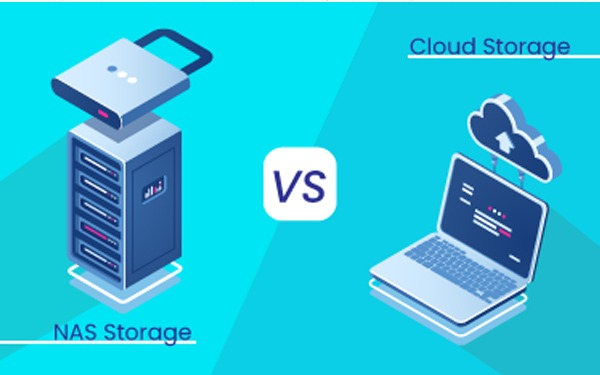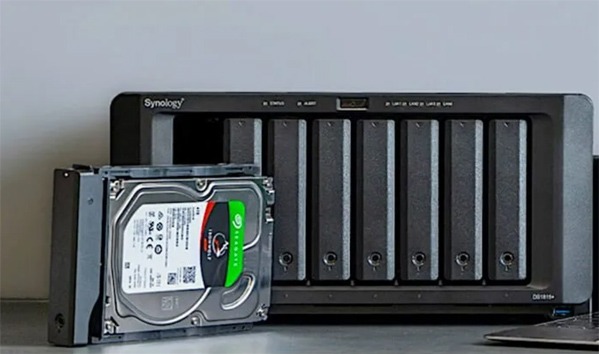Tại Google Cloud, Google cam kết cung cấp cho khách hàng sự lựa chọn hàng…
Will Cloud Storage replace NAS?
In the current era of digital transformation, everything is digitized quickly. The same goes for storage solutions, the old and traditional ways of storing data in documents or on paper have been eliminated or replaced. Currently, two of the most commonly used storage solutions today are NAS (Network Attached Storage) and Google Cloud Storage. Both have great features, depending on the user's needs, both can have very different pros and cons. In this article, we will look at the differences between NAS and Cloud Storage and whether Can Cloud Storage replace NAS? In this 4.0 era, no.

Overview of NAS and Cloud storage
Network Attached Storage (NAS)

NAS is a network-connected storage device that allows users to store and retrieve data from a central location for authorized users.
NAS devices are easily customizable, as you can add additional storage if you need more. It is the perfect choice for personal backup for large-scale manufacturing and business companies that require centralized storage for their huge data.
Cloud Storage

Google Cloud Storage is a storage method that stores your data on the Internet through cloud computing providers.
Cloud Storage does not require any physical device on the part of the user, other than their PC or laptop. It follows its motto of storing your data anytime, anywhere. Users can easily add more storage capacity by paying service providers.
This service is perfect for small businesses that need to back up documents, image graphics, and even light video files.
Compare NAS and Cloud Storage
Pricing
- NAS: The price of a NAS system depends solely on the storage capacity required.
If you want more storage capacity, you can purchase additional hard drives to attach to your existing NAS devices. Prices for NAS range from 500 USD to 1000 USD. Additional hard drive prices may vary depending on the service provider. The price of NAS is quite high, so careful consideration should be given before investing in a NAS storage system
- Cloud Storage: Cloud services are relatively cheap compared to NAS devices.
Most service providers will give new users 1 FREE storage space without any upfront payment. If users want more storage, they buy more from the provider with just a few clicks from the website. Prices for Cloud Storage range from a few dollars to hundreds of dollars monthly, depending on the amount of storage needed. Some cloud providers even offer free prepaid storage to new users.
Share Data
- NAS: NAS has more access and sharing capabilities than Cloud Storage.
Users can connect their NAS to devices, such as smart TVs, laptops, custom apps, smartphones, etc. It is extremely convenient, as it only requires 1 plug. and run to access all stored data.
Sharing data with a NAS is the perfect solution for a group of people who work every day with large files. The requirement to continuously store and retrieve large-sized data makes NAS one of their best choices. Additionally, you own your NAS so you will be responsible for securing your own data.
- Cloud Storage: On the other hand, Cloud Storage is used by most IT Companies, Startups and even F&B stores for their business storage activities.
Cloud Storage can be accessed anytime, anywhere. With just a few clicks on a laptop or a few taps on a smartphone, data can be accessed easily. This makes data sharing convenient because business can be done anytime, anywhere. Of course, a seamless experience will depend a lot on your internet speed.
There are no additional hardware requirements, so Cloud Storage will always be the primary choice for small business owners. Data security can be a concern for some people because they worry if the cloud storage provider can view and access their data for improper use. Some providers will request reserved permissions to scan and read what you store on their servers.
Backup and reliability
- NAS: If you only have one drive for your NAS Device, an alternative data backup solution is needed.
The backup level and reliability of NAS is quite low compared to Cloud Storage. There are a number of situations that often cause huge trouble for NAS users:
– Hardware problems – When a NAS device breaks down, the maintenance process becomes troublesome. Failure of one of the NAS Hard Drives can easily be replaced with a new hard drive, but damage to the NAS Device cannot be repaired. Furthermore, one cannot guarantee 100% data will be completely protected while maintenance is taking place.
– Power shortage – Network-attached storage devices depend on power sources and when power shortages occur, the operations of companies and groups that rely heavily on data stored in NAS Devices will be interrupted or interrupted. delay.
- Cloud Storage: On the other hand, cloud services have better backup capabilities and reliability than NAS.
No need to connect your laptop or PC to another device, you can upload or download data anytime, anywhere.
Some features of Cloud Storage that really stand out include:
– User Friendly – It is extremely user friendly as it does not require any skills to install and set up any device. Most providers will offer an automatic backup option, allowing users to continuously back up their data without having to manually upload files every time.
– Backup – Mainly cloud backup/storage, data is backed up on multiple servers. A failure in one server will not affect your data because it is stored in other cloud backup servers
Storage limits
- NAS: The storage size of a NAS device depends on the number of drives you have.
The more drives you install in your NAS, the more storage capacity you will get.
There are two main types of network-attached storage device configurations on the market. The first type offers fixed storage capacity that can range from 500GB to 4TB. The other type is when you need more capacity. You can install additional hard drives to increase storage capacity, up to 10TB.
- Cloud Storage: Storage capacity is lower than NAS, but it has other advantages over NAS.
One of the main benefits of cloud hosting is that you don't have to worry about constant upgrades (no maintenance required). Most Cloud Storage service providers will offer free initial capacity of 5GB-15GB. Gimasys is sure that all of you are using services like Google Drive. When you run out of space, you can easily upgrade by paying the service provider. No additional equipment required. This is essentially a 'click and done' upgrade.
What type of business will NAS and Cloud Storage be suitable for?
The user audiences of NAS and Cloud Storage can be very different.
Most NAS users come from Manufacturing companies, Communications companies and Hardware Manufacturing companies. These sectors require their employees to process/work with a huge volume of data on a daily basis and NAS is their best storage option. With the flexibility of sharing data across connected devices, NAS is very popular in these fields.
On the other hand, Cloud Storage services are more commonly used in small and medium-sized businesses, schools or students, law firms, and many business establishments. Due to its low maintenance costs, it is quite popular among small and medium business owners. It is also more user-friendly than NAS.
Conclusion
In this article, we will find out the answer Can Cloud Storage replace NAS? are not?. By comparing each feature of the two products in detail, it can be concluded that NAS and Cloud Storage are two separate products suitable for different types of businesses and Cloud Storage at the present time is not yet available. Can completely replace NAS. And here, Gimasys hopes you will have a suitable answer about the type of storage suitable for your business.
Gimasys - Google's Premier Partner in Vietnam is a provider and consultant on the structure and design of the optimal Cloud solution for you. For technical support, you can contact Gimasys – Premier Partner of Google in Vietnam at the following information:
- Hotline: 0974 417 099 (HCM) | 0987 682 505 (HN)
- Email: gcp@gimasys.com
Source: Gimasys



